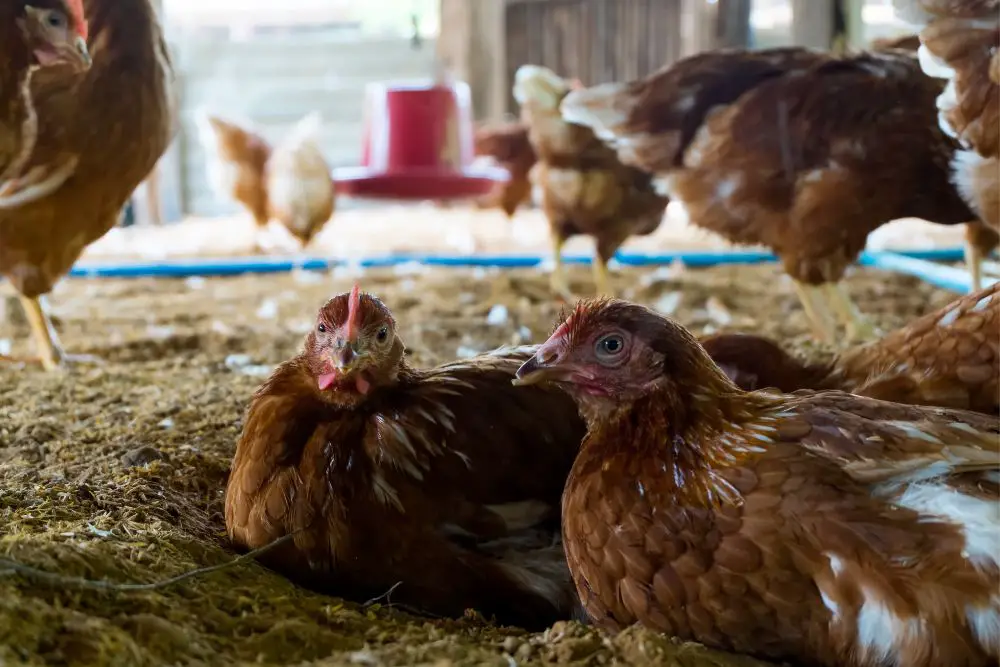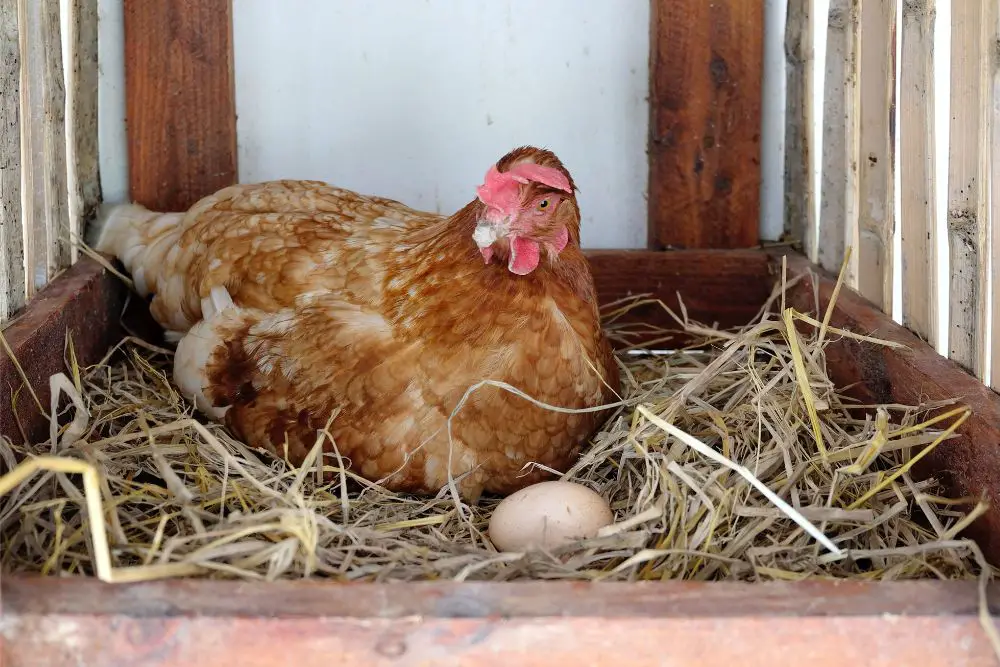Breaking a broody hen is best done by removing a hen from a nesting box and having her isolated in a cage with food and water. If that's not possible, then a cold water bath or placing a frozen bottle in her box will reduce her body temperature and stop her from trying to hatch unfertilized eggs.
Having a broody hen around is fantastic if you’re trying to increase your flock size by raising chickens of your own. Mother hens are great for taking care of baby chicks and allow you to forgo having to always use an incubator and brooder.
However, if your primary purpose for having chickens is to produce eggs for eating, then a broody hen can be a problem. Not only will one broody hen start causing problems, but they can lead your other hens to join her bad habits.
Fortunately, there are several ways to break a hen’s broodiness, most of which require just a few simple steps
Table of Contents
Break A Broody Hen in 5 Steps
How do we stop a chicken that’s gone broody? Thankfully there are 5 steps that you can take to ensure that your broody hen returns to her old self and no longer affects the rest of your egg-laying flock.
1. Remove The Broody Hen From The Nesting Box
The first step in stopping your broody bird is pretty self-explanatory: remove the hen from the site of her broodiness. Simply taking the hen out of the nesting box while she is broody will allow her fresh air and might reawaken her other sensibilities.
2. Clear Out And Lock Up The Nesting Box
Once your hen is out of the nesting box, remove all of the hen’s eggs and get rid of all nesting materials. If she returns to an empty nest, the broody hen won’t be as inclined to return to those habits.
Wait several days before you reset the bedding, as your broody hen won’t be inclined to stay in the nesting box if she is uncomfortable. If it seems like she’s still interested in hunkering down in the empty nesting box, then you might want to close up the box for a few days until it seems like she’s acting normally again.
3. Place A Frozen Water Bottle In The Nest
Placing a frozen water bottle underneath a nesting broody hen will cool them down. It’s theorized that lowering a hen’s body temperature will lessen their need to brood. You’ll want to avoid using plain ice cubes, as they will melt and cause your nesting box to be wet.
When a chicken is broody, their body temperature naturally rises in order to properly incubate the eggs. The presence of a cold water bottle will cool a hen off and hopefully also cool off their attitude.
4. Cold Water Baths
Similar to the frozen water bottle technique, giving your hen a cold water bath will also regulate their body temperature. Once you’ve drawn a bath with cool water, submerge your hen’s body under the water for at least 5 minutes. Your chicken will dislike this, so be sure to calm her by gently holding her and offering treats, such as mealworms, if necessary.
Once your hen has been cooled off in the bath, dry them thoroughly before letting them return to the coop. Repeat this process a couple of times throughout the day or as you see necessary.
5. Remove Broody Hen From Coop
As a final measure if your hen still remains broody, remove them from the coop. Keeping broody chickens in their own confined area is a good idea to stop them from nesting entirely and to keep your other hens from also growing broody.
You want to make sure that your makeshift chicken jail is equally secure as your primary coop and meets all of her other needs of food, water, and a wire cage to roost in. A medium-sized dog crate will usually work perfectly as a broody breaker.
Check-in on her regularly to see if her behaviors are returning to normal. Your hen should be ready to return to the rest of your flock after just a few days, just make sure she’s behaving more normal and that she will remain calm when returned to the coop.
Reasons Why A Hen Goes Broody
Hens go broody when they want to start hatching their own eggs. This is due to a lot of different variables but is largely due to a hormonal change caused by a shift in the seasons.
Broodiness usually becomes a problem in the late spring to early summer when the days start to get longer and warmer. As a hen is exposed to more sunlight and heat, her body will release a hormone called prolactin from the pituitary gland. This is what triggers the natural instinct to go broody and start nesting on her eggs all day long.
Most chicken keepers are able to identify broody chickens easily by the dramatic shift in their behaviors. A broody hen will grow highly irritable, rarely will leave the nesting box, and will likely eat less and begin to lose weight.
This is because her mindset is so focused on protecting and incubating the eggs that she begins to neglect the rest of her surroundings. She will likely stop laying eggs once her clutch of eggs is full. An overcrowded and full nesting box can completely halt your flock’s ability to produce eggs.
Risks Of Keeping A Broody Hen
The behaviors of a broody hen will lead to a variety of issues within your flock. Broodiness halts egg production, leading to other bad habits and potential health issues.
A broody hen will spend most of her time in the nesting box that’s already full of eggs. Not only will your other hens not be able to lay eggs in the nesting area, but this increases the risk of having those eggs bump into one another and crack. Damaged and broken eggs could lead to the habit of egg eating, which is another dangerous habit that can be tricky to stop.
Broodiness can also be contagious in the sense that once one hen goes broody, this can trigger the hormonal cycles of your other hens. Having multiple broody hens can be somewhat dangerous as they will be agitated and highly protective of their eggs. If your hens usually share a nesting box, having to compete for it could lead to some serious fights.

Health issues are also a concern in overly broody hens. Because a broody hen will be constantly resting over her eggs in the nesting box, she’s at greater risk of contracting mites or other parasites who prefer shaded and damp areas. They will also start to peck out their breast feathers to use in their nest, leaving their skin more exposed to potential pests.
This is especially true if you aren’t able to properly clean out the nesting box as she sits in it for the approximate 20 to 21 days it takes to hatch eggs. If she’s laying on unfertilized eggs, this habit will continue in perpetuity or until the eggs start to break.
Common Breeds That Go Broody
Some breeds of chickens are known to be more broody than others. It is most predominantly seen in dual-purpose and heritage breeds, as most egg-laying breeds have been selectively bred to reduce the amount of broodiness.
Breeds that are known to be especially broody include:
- Black Silkies
- Cochins
- Buff Orpingtons
- Wyandottes
- Speckled Sussex
- Brahmas
- Australorps
While many of these breeds make for great breeding stock, they are prone to reduce your overall egg production when broody. All of them are known to make great mothers and pets as backyard chickens. So if you’ve got fertile eggs that need to be mothered, look no further!
Similarly, there are also several breeds that are considered non-broody. These breeds are usually high in energy and personality, which keeps them more interested in moving around the coop and foraging instead of nesting.
Non-broody breeds include:
- Sebrights
- Polish
- Black Sexlinks
- Rosecombs
- Sicilian Buttercups
- Easter Eggers.

